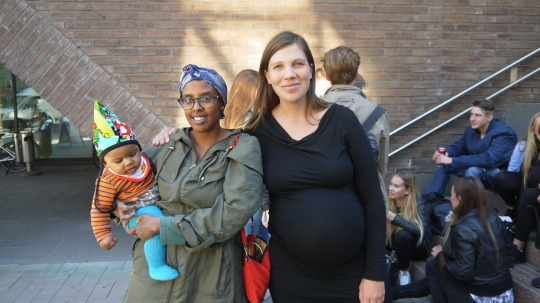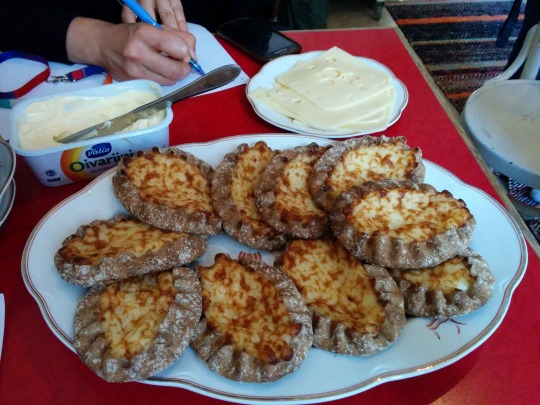#CaringIntheCity ECF
Text
An afternoon with Finnish activists, mothers and educators
After our institutional interviews, it was time to get in touch with more informal realities. We wanted to meet people who, like us, are closer to the social movements than to the institution. Thanks to Lotta Meri Pirita Tenhunen, a researcher specializing in political communities and a Finnish activist based in Madrid, who got us into contact with several people. We were lucky enough to spend an afternoon getting to know other realities and other glimpses about raising and caring for kids in Helsinki.
The first stop was in the cafe of a central bookstore. We were meeting Warda Ahmed, cartoonist, activist, cultural worker and feminist, and Atlas Saarikoski activist and feminist journalist. And both, moreover, mothers. We had a coffee listening to their views about the current situation for people like them who are caring in Helsinki, with more than one child, aware of and active in the political situation and with cultural interests and temporary jobs.

Some of the most powerful issues we addressed were:
The cuts are affecting the maintenance at home policies and the day care quality
Currently, the home stay money allows you to stay up to three years caring for your child at home. However, the achievements of the seventies feminists fights are now in danger because the conservative government is calling it into question. There is talk of the transition to new benefits such as the Icelandic model (which contemplates 6 months per parent and 6 months enjoyed by both), which, whether or not they have positive aspects, are a reduction of the current three years. Another backlash of the neoliberalism here In Finland.
Since the beginning of the crisis, the cuts have not stopped hitting. The current government wants to justify the reduction of aid to care for children at home with the twisted argument that the people who benefit from this assistance are mostly migrants and excluded sectors, to whom a job would serve to "turn them into functional citizens". The result is the impoverishment of the parents, especially mothers, since the type of work she can access (the increase in the unemployment rate is a pressing reality in Finland) will have low salary and conditions. There is a whole ongoing debate in Finland, even within feminist currents, on this issue.
The changes are happening very fast and the cuts have not stopped coming. And, most dangerous, they often do so in the name of the liberation of women. Strategies of the right wing are to disguise the cuts policies in the name of feminism and of protecting poor and migrant women (they can be at home). This upper class argument shows its worst face against minorities and poor people.
The decrease in the quality of care and education services is another expression of the cuts and something that is very worrying is the increasing of the ratio of the day care groups.
-Isolation and (Not) Equal Homes
"Staying at home gives you some kind of freedom", recognizes Atlas, who is about to have her third child, "but it also isolates you. "In spite of the wide range of care options that Finnish families have (home policies to take it home, nursery, kindergarten, Pre-School, alternatives between Nursery or take it at home, Family Caffés, or cultural activities at the parks, specially in summer, where free lunch is given), the phenomenon of isolation continues to occur, especially among people who decide to raise at home. That argument has also been used in a twisted way by the government, who argues that with less help, people will leave the house and integrate more.
Therefore, the vertigo of staying at home and of not being able to do anything but caring and somehow being disconnected from the world is just as present among Finns as among the inhabitants of southern Europe, as we could see in the first part of our research. A lot of mothers are scared of being at home because of this tendency.
Nor do labor policies help in this regard since, although the law protects working mothers, employers look at age and reproductive possibility as a determining factor.
Another problem shared between mothers in northern and southern Europe is the question of households or non-egalitarian couples. The issue of permissibility of permits and non-transferability is also in the debate of the Finnish Feminist Party -as we are told by Warda, one of its leaders- who is studying the program of measures of the Swedish Feminist Party to try to do their adaptation to Finnish reality.
Atlas thinks it is fundamental that both parents could spend at least two years ideally
so that the implication was more balanced. Regarding the symbolic asymmetry between genders in relation to care, it is worth it to look at the cultural stigma of childcare for Finnish man (with respect to his Scandinavian companions). The fact that the term "Swedish Dad" exists referring to a man dedicated to childcare and, therefore, or implicitly, not entirely masculine, speaks for itself. We say goodbye to Atlas and Warda, in a very grateful mood. And wishing luck to Warda! Next year there will be municipal elections in Helsinki and the Feminist Party will take power!
Afterwards, we were fortunate to be invited for coffee at Solja Kovero's house, a philosopher and activist and her two companions, Anki Sievänen, experienced teacher at Kindergartens and Heidi Kangas, former Kindergarten teacher, and now university student to be Secondary Teacher. And Punni, Heidi's daughter! We were greeted with a huge tray of Karelia, the typical Finnish cake, made by Anki.

With them we addressed the issue of education in particular. They gave us a review of the modalities and the current conditions of Kindergarten, institutions that they both know very well. Kindergarten is not totally free but mostly affordable because it depends on the parents’ income. On the other hand, Private DayCare is very expensive (if you are not registered you do not have the right to DayCare). Pre-schools are free (from 3 to 6) and they were created in the seventies.
The question of the cutbacks related to education came out immediately. Anki also told us about the increasing ratio per class and the lack of staff. In general terms, the quality of education is getting worse (less space, less activities) because of the decreasing of resources. Although, public kindergartens are still great places and people trust in them, although this trend is changing now because of the lack of resources. The middle class is changing now, looking for something special such as innovative pedagogy.
Heidi told us about her experience about being a young mother of a baby (Punni is one and a few months) still studying. She does not receive allowance or extra benefits at the university. Punni is now in DayCare, but she still needs help from some friends, as her partner is working full time. Here in Finland, it's more common that people rely on relatives than on friends.

We were also talking about the issue of (Not) Equal Homes. In 99% of the cases, the women are the ones who stay at home for a long time and also women are more engaged with education, indeed it's a challenge for Finnish society to get over this gender gap. Anki and Heidi complaints about the same idea that everybody has about Finland, but this is a superficial view. "Finland is not so equal. The glass ceiling is also an issue". Especially with the new conservative politicians putting more and more pressure on women (pressure to be mothers, to be the perfect mother, to parenting as a way of consuming) with their conservative culture. "The new right wing (now in government) is the most horrible government for women”.
For all these questions, Heidi thinks it could be crucial to develop more solidarity between parents to fight against isolation; more flexibility to do things collectively and imagination to create a collective childcare system (it's not even easy in big cities).
For Anki it is important to say how much time the kids spend at Kindergarten (8 or 9 hours) and to develop special policies to avoid the creation of ghettos. Both of them agree on how city planning is a deciding factor in avoiding segregation. Cheap houses are in certain areas, far from the center, where it's difficult to mix. This favors racist structure in everyday life, which allows discrimination and makes Helsinki a less friendly city.
We finished our day exhausted but happy to have gotten to know all these warm and interesting women! Thanks to all.
1 note
·
View note
Text
Preparing our trip to Finland…
In September, we started to prepare our trip to Finland by reading all we could find about this country and setting dates for meeting with some people we would like to know and interview. There were so many possibilities open... In Spain it is very common an idealized view on Scandinavian countries’ Welfare State, on their long and fully paid parental leaves, on their successful education system, on the gender relations based on equality… We wanted to discover if that was a realistic picture or not.
We started by documenting us on Finnish Welfare State and the comparison between Spain and Finland family policies was pretty depressing:
>>In Spain the maternity leave is 16 weeks with 100% of the salary. Paternity leave is only two weeks. In Finland the maternity leave consists of 18 weeks, the parental leave of 26 weeks, and the paternity leave of about 9 weeks.
>>In Finland children attend daycare when they are one year old, because the parental leave covers their first 12 months of life. In Spain many babies start daycare when they are only four months old.
>>In Madrid the ratio in daycare is of 15 children per adult, in Finland it is of 4-5 children per adult…
>>In Finland daycare lasts until children are seven years old. In Spain, children start school when they are three. Many Spanish experts and organizations demand that daycare should last until 6 and children should start school then.
>>In Finland, parents with children under the age of three can decide whether they want to take their kids to daycare or they want to educate them at home. If they choose the second option, they receive an allowance. In Spain, public daycare is only available for working mothers. If a woman is unemployed, the state considers that she has to take care of her baby for free.
>>Finland’s school system is public and free. It is considered one of the best educations of the world. Spain’s… oh, well. Madrid, our region, has every record on bad education: it is considered the most segregated and unequal schools in the country, it has the highest ratio of students per class, etc.
>>We were also excited to get know the informal spaces that the public system and NGO’s based there offer to the families as the Family Café experience.

Nevertheless, we also learned that, unlike in Spain, the health service is public but not free in Finland (you can see more information in this article ).
But we also learned that the glory days of the Finnish Welfare State are probably coming to an end. The financial crisis that has hit Southern Europe so hard has also reached Finland. The country main industries, wood and cell phone technology, are suffering and having a bad time, the unemployment rates and the public debt are rising. The right wing coalition that rules the government since 2015 has announced that it will they are going to undertake a series of cutbacks in Welfare, and many of these affect family policies.
0 notes